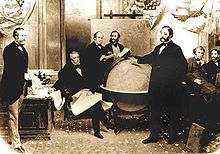“Punting the Pundits” is an Open Thread. It is a selection of editorials and opinions from around the news medium and the internet blogs. The intent is to provide a forum for your reactions and opinions, not just to the opinions presented, but to what ever you find important.
Thanks to ek hornbeck, click on the link and you can access all the past “Punting the Pundits”
Katrina vanden Heuvel: Are there no standards for punditry?
Last Sunday, ABC’S “This Week” turned to none other than Donald Rumsfeld, the former Bush administration defense secretary, to get his informed judgment of the mission in Libya. Last month, the journal International Finance featured former Federal Reserve chairman Alan Greenspan commenting on what is “hampering” the economic recovery.
Fox News trumped even that, trotting out retired Marine Col. Oliver North, the former Reagan security staffer who orchestrated the secret war in Nicaragua, to indict President Obama for – you can’t make this stuff up – failing to get a congressional resolution in support of the mission in Libya.
Next we’ll see a cable talk show inviting the former head of BP to tell us what it takes to do offshore drilling safely.
Susan Feiner: Assault on Public Unions an Affront to Women’s Historic Gains
Wisconsin Gov. Scott Walker’s slash-and-burn approach to public sector unions — imitated by over a dozen Republican governors across the nation — is the political equivalent of slamming women’s labor history into reverse. Right in the middle of Women’s History Month.
While women represented 57 percent of the public-sector work force at the end of the recession, women lost the vast majority–79 percent–of the 327,000 jobs cut in this sector between July 2009 and February 2011, according to a January report by the Washington, D.C.-based National Women’s Law Center.
Of course these job losses–and those still to come–have a bad ripple effect, leading to even more unemployment, spreading the pain far beyond the initially affected workers.
Ruth Marcus: Obama fills in some important blanks on Libya
In his speech Monday night to a public thoroughly, and understandably, befuddled about U.S. policy in Libya, President Obama began to fill in some important blanks. The White House would dispute this assessment, but Obama’s remarks came unfortunately late. Rallying the public behind “kinetic military action,” my new favorite phrase, requires explanations sooner rather than later. This is especially true when it is a kinetic action of choice, not necessity; in the nervous aftermath of Iraq and Afghanistan; and in the relentless context of a 24-7 news cycle.
And especially when the run-up to action has been so herky-jerky, with clashing messages about the wisdom and feasibility of a no-fly zone and a confusing bifurcation of means and ends. It is U.S. policy that Moammar Gaddafi should – indeed, must – go, but that is not the stated aim of the military action.

 Russia was in a difficult financial position and feared losing Russian America without compensation in some future conflict, especially to the British, whom they had fought in the Crimean War (1853-1856). While Alaska attracted little interest at the time, the population of nearby British Columbia started to increase rapidly a few years after hostilities ended, with a large gold rush there prompting the creation of a crown colony on the mainland. The Russians therefore started to believe that in any future conflict with Britain, their hard-to-defend region might become a prime target, and would be easily captured. Therefore the Tsar decided to sell the territory. Perhaps in hopes of starting a bidding war, both the British and the Americans were approached, however the British expressed little interest in buying Alaska. The Russians in 1859 offered to sell the territory to the United States, hoping that its presence in the region would offset the plans of Russia’s greatest regional rival, Great Britain. However, no deal was brokered due to the American Civil War.
Russia was in a difficult financial position and feared losing Russian America without compensation in some future conflict, especially to the British, whom they had fought in the Crimean War (1853-1856). While Alaska attracted little interest at the time, the population of nearby British Columbia started to increase rapidly a few years after hostilities ended, with a large gold rush there prompting the creation of a crown colony on the mainland. The Russians therefore started to believe that in any future conflict with Britain, their hard-to-defend region might become a prime target, and would be easily captured. Therefore the Tsar decided to sell the territory. Perhaps in hopes of starting a bidding war, both the British and the Americans were approached, however the British expressed little interest in buying Alaska. The Russians in 1859 offered to sell the territory to the United States, hoping that its presence in the region would offset the plans of Russia’s greatest regional rival, Great Britain. However, no deal was brokered due to the American Civil War. Recently, US State Department spokesperson, P.J. Crowley was forced to tender his resignation becuase he had the audacity to call the inhumane treatment of PFC. Bradley Manning “ridiculous, counterproductive, and stupid”. He is now
Recently, US State Department spokesperson, P.J. Crowley was forced to tender his resignation becuase he had the audacity to call the inhumane treatment of PFC. Bradley Manning “ridiculous, counterproductive, and stupid”. He is now 
Recent Comments